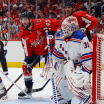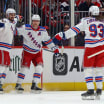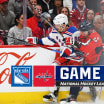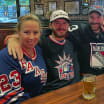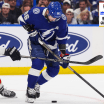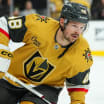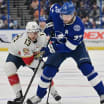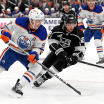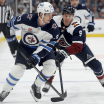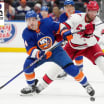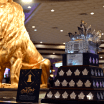ANN ARBOR, Mich. -- Early in the 1997-98 season, the University of Michigan hockey team visited University of Alaska Fairbanks. As the bus drove through a blizzard to the morning skate, coach Red Berenson called captain Matt Herr to the front.
Berenson, influential coach, earns place in U.S. Hockey Hall of Fame
Michigan legend was first player to go straight from NCAA to NHL
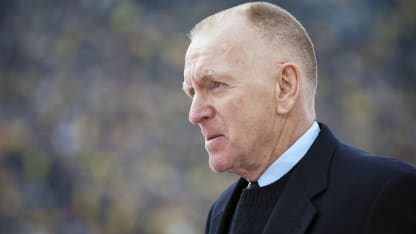
© Icon Sports Wire/Getty Images
"I just want to make sure we're ready to play," Berenson told him.
The bus stopped about a mile from the rink. Berenson disembarked.
"So we all get off the bus in this blizzard, and we're walking to the rink," Herr said. "And who's leading the way? Red Berenson."
The Wolverines won back-to-back games 6-3 and 4-3.
That was Berenson, who will be inducted into the United States Hockey Hall of Fame in Nashville on Wednesday after an epic career in the NCAA and NHL as a player and coach.
He was a trailblazer, tough mentally and physically. With a few words and a piercing stare, he could make you uncomfortable, make you think, challenge you. But he did it to bring out your best, and he walked the walk.
Many who followed his example reached their destination, and that goes beyond hockey.
Berenson will be inducted into the U.S. Hall of Fame mainly because of his 33 years as coach at Michigan. He won 848 games, fourth in NCAA history, and two national championships, helping college hockey become a viable route to the NHL so players didn't have to choose between getting an education and chasing their dreams.
"It just reassures me that I did the right thing for all that time, and it should reassure other people that college hockey is the way to go," Berenson said. "If you go with the right attitude, you really get the best of both worlds. I think this induction is a reassurance that this has been good for college hockey and good for U.S. hockey."
Berenson could have turned pro after high school in Regina, Saskatchewan, but wanted to find the U.S. college with the best combination of academics and athletics.
Montreal Canadiens general manager Frank Selke warned Berenson if he took that path, he wouldn't make it as a pro. Berenson went to Michigan anyway.
As a senior in 1961-62, Berenson had 70 points (43 goals, 27 assists) in 28 games. He's still tied for the school record for goals in a season.
The day after his last game for Michigan, Berenson played his first for Montreal. He became the first player to go straight from NCAA hockey to the NHL, while graduating with a bachelor's degree in business.
After he won the Stanley Cup with the Canadiens in 1965, he was back in an Ann Arbor classroom starting on his MBA, which he received in 1966.
Berenson played 17 seasons in the NHL for the Canadiens, New York Rangers, St. Louis Blues and Detroit Red Wings. He had 658 points (261 goals, 397 assists) in 987 games.
At his peak he was one of the best players in the League.
He scored six goals for the Blues in an 8-0 win against the Philadelphia Flyers on Nov. 7, 1968, tied for the most goals in a game since 1920.
He had 82 points (35 goals, 47 assists) in 76 games for the Blues in 1968-69 and was fourth in voting for the Hart Trophy, behind Phil Esposito, Jean Beliveau and Bobby Orr.
The next season he had 72 points (33 goals, 39 assists) in 67 games for the Blues and was third for the Hart behind Orr and Tony Esposito.
Oh, and he played for Canada in the 1972 Summit Series too.
"When you have the opportunity to learn from somebody who's actually walked the walk and done exactly what you want to do, I think the message is just that much stronger," said former center Brendan Morrison, who won the Hobey Baker Award at Michigan in 1997 and played 14 NHL seasons.
Berenson won the Jack Adams Award in his only full season as an NHL coach, guiding the Blues to 107 points in 1980-81.
Michigan athletic director Don Canham convinced Berenson to return to his alma mater in 1984. During the previous decade, the Wolverines had gone 204-335-12.
Berenson went 848-426-92 and the Wolverines made the NCAA Tournament 23 times, including 22 straight from 1991-2012. Michigan reached the Frozen Four 11 times and won the NCAA championship in 1996 and 1998. Yost Ice Arena, Michigan's home rink, developed one of the best atmospheres in hockey, with raucous, chanting fans.
More important, Berenson created a program that molded men from recruitment to retirement.
On a recruiting trip in 1992-93, a young Jason Botterill toured Yost. In the gym, Berenson said a good sign of strength was 10 perfect chin-ups.
"There was this awkward silence, and then he just sort of says, 'Well, seeing as you're not going to try it, we'll assume you can't do it,'" Botterill said. "I'm just looking at my dad like, 'Is he serious?'"
The Wolverines did a 5-mile run on a golf course each season. Before his first in 1993-94, Morrison huddled with his fellow freshmen when Berenson approached.
"He just casually walked by us and glanced over," Morrison said. "He said, 'Geez, I sure wouldn't want to embarrass myself today.' We were already as nervous as could be as it is. He threw a little subtle message to give us extra motivation."
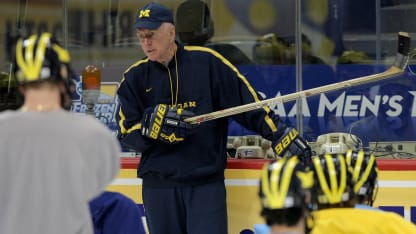
© Doug Pensinger/Getty Images
The players would come to the rink, and Berenson would be sweating on the NordicTrack to stay in shape. They would come back for alumni games and he'd be backchecking. They come back now, and he's still working in the athletic department as an adviser at age 79.
"You as a player, a college kid, would be like, 'Oh my god, I can't let Coach work harder than me,'" said Herr, who played forward at Michigan from 1994-98 and 58 NHL games from 1998-2003. "You always felt like you were letting him down if you didn't work hard."
Berenson helped 73 players go from Michigan to the NHL. About a third of NHL players today have spent at least some time in college in the United States.
"When you look at the NHL now, it's not an exception when a college player makes the jump to the NHL," Berenson said. "In fact, it's the norm. I know when I started, it wasn't."
But most don't make the NHL and no one plays forever.
Take Botterill. The Dallas Stars selected him No. 20 in the 1994 NHL Draft. He could have left school early but stayed four years. He played 88 NHL games and retired because of concussions, but went back to Michigan and earned his MBA, like Berenson did. He's now general manager of the Buffalo Sabres.
Berenson constantly pressed his players about post-hockey plans. They'll tell you he is most proud of those who went on to careers in medicine, law, finance and business.
"If you've ever been around Red, you understand that accomplishments in life don't have much to do with sports," said former goaltender Marty Turco, who won 127 games at Michigan from 1994-98, still the NCAA record, and 275 in the NHL from 2000-12. "It's about attitude and continuing to grow as a person."
More than anything, he wanted to make sure his players were ready for life.
"He walked the walk," said Blake Sloan, who played four seasons (1993-97) as a defenseman at Michigan and had a 16-season pro career as a forward, including 290 NHL games and a Stanley Cup championship with Dallas in 1999. "He was demanding, but there was a great, great, great deal of respect that he earned because of that.
"And guys listened. Guys really wanted to go out and do the things that he asked, because they wanted to please him. They wanted to do what was right."


